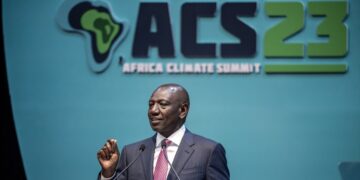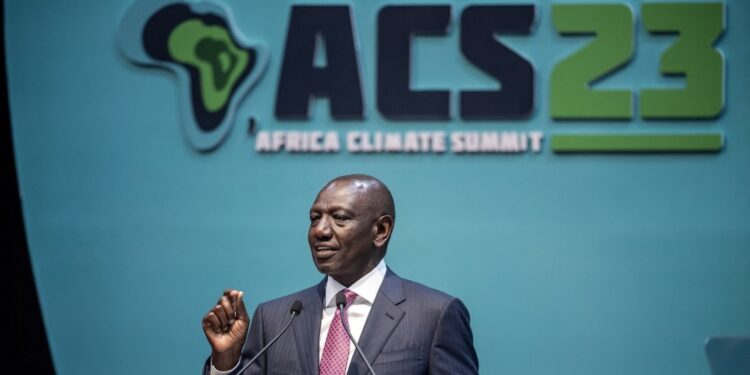By John Ikani
Kenya’s president, William Ruto on Monday, said Africa has the opportunity to lead the world in climate action as he geared up to inaugurate the Africa Climate Summit in Nairobi.
The inaugural summit which kicked off on Monday aims to reposition Africa as an emerging hub for renewable energy.
It precedes a series of diplomatic gatherings, culminating in the November COP28 climate summit in the oil-rich United Arab Emirates.
The event is expected to be marked by competing visions for the global energy landscape.
The Nairobi summit will unite leaders from the continent’s 54 nations to delineate a common vision for Africa’s sustainable development.
This endeavour is quite ambitious, considering the political and economic diversity within the region, with many communities facing heightened vulnerability to climate change.
President Ruto revealed the African stance on climate action, stressing the need to “save lives and the planet from calamity.”
“We aim to outline a new growth agenda that ensures mutual prosperity and sustainable development,” he wrote on the X platform, formerly known as Twitter.
Ruto stressed Africa’s commitment to seizing this unique opportunity to steer the world toward comprehensive climate action.
To achieve these objectives, Ruto called on the international community to facilitate financial support for Africa and alleviate the mounting debt burden on African nations.
Joseph Nganga, appointed by Ruto to lead the summit, underscored that the conference is designed to demonstrate that Africa is not merely a victim but a proactive continent with solutions for global challenges.
Security measures have been intensified around the summit venue in central Nairobi, where over 30,000 people are attending the three-day event.
Formidable Challenges –
A preliminary version of the summit’s final declaration, seen by AFP, highlights Africa’s substantial potential in renewable energy, its youthful workforce, and abundant natural resources.
The resources include 40 percent of the world’s reserves of cobalt, manganese, and platinum, crucial for batteries and hydrogen fuel cells.
Nevertheless, Africa faces substantial challenges, with hundreds of millions of people currently lacking access to electricity.
Despite boasting 60 percent of the world’s premier solar energy resources, Africa’s installed capacity is approximately equivalent to that of Belgium, as stated in a recent commentary by Ruto and the Chief of the International Energy Agency, Fatih Birol.
Currently, only about three percent of global energy investments are directed toward Africa.
Charra Tesfaye Terfassa, representing the think tank E3G, emphasized that the summit must strike a balance between optimism and a realistic assessment of the challenges to “pave a new course for Africa to actively engage in the global discourse and capitalize on transition opportunities.”
Notable dignitaries at the summit include several African heads of state, UN Secretary-General Antonio Guterres, European Commission President Ursula von der Leyen, among others.



































